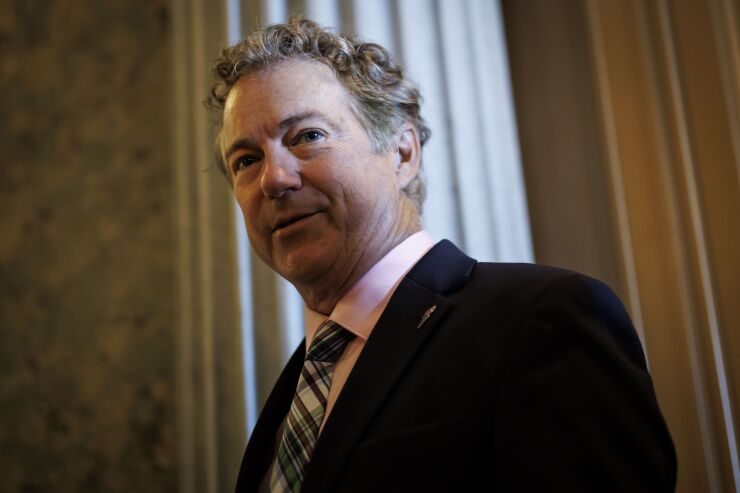The Federal Reserve's dormant emergency lending program for state and local governments set up during the COVID-19 pandemic had a surprise return to the spotlight last Friday when Sen. Rand Paul, R-Ky., introduced a measure banning the central bank from reviving the program or buying municipal bonds in the future.
"It was never intended that Congress give the Fed the power, and we should make sure that it is explicit that the Federal Reserve cannot buy the debt of individual states,"
The measure appears aimed at the Fed's
Muni advocates including the Government Finance Officers Association were taken by surprise, said GFOA federal liaison Emily Brock.
"No one in our coalition was aware this would be introduced," Brock said. The amendment failed, but could pop up again, Brock warned. The GFOA has asked to meet with Rand's office to discuss the measure.
"As long as there's a permanent spending bill still lingering out there, I think it will come up again," she said.

The Fed
The MLF was able to purchase up to $500 billion of three-year notes from states, counties with a population of at least 500,000 residents, and U.S. cities with a population of at least 250,000 residents.
Only Illinois and New York's Metropolitan Transportation Authority ended up tapping the program, with Illinois borrowing $3.2 billion in two installments and the MTA borrowing $3.5 billion in two installments.
The MLF expired in December 2020, although
Rand's
Paul — a well-known anti-national debt hawk —
"We now know that the Federal Reserve is not only buying the federal debt; they are buying the debt of profligate, large-spending states like California, New York, and Illinois," Paul said on the floor when introducing the amendment. "My amendment would make it explicitly illegal for the Federal Reserve to buy the debt of these big-spending, profligate individual states.
Minnesota Democratic Sen. Tina Smith responded that "tying the Fed's hands" would be dangerous.
"Congress has given the Fed the flexibility to transact in state and local bonds because we knew that it could be an important and helpful tool in times of an emergency," Smith said. "Preventing emergency programs outright would be dangerous and unnecessary."
The amendment garnered 37 yes votes, all from Republicans. Supporters included Senate Majority Leader Mitch McConnell, R-Ky., as well as Sen. John Thune, R-S.D., and Sen. John Cornyn, R-Texas. The nays totaled 53, and 10 senators did not vote.
Paul's comments on the Senate floor were "hyperbolic" as well as "curious and disturbing," said Kent Hiteshew, former deputy associate director of the Fed's Division of Financial Stability.
"The Fed has used its emergency statutory authorities to make loans to municipal governments only twice in its more than 100-year history — both back-stopped by Congressional appropriations during COVID," Hiteshew said, noting that both loans were repaid on or before their due dates.
"In my view, it is doubtful that the Fed would use such powers again in the future absent similar existential threats to the economy and capital markets," he said. "Nevertheless having such authority and independence would be crucial in such circumstances."
Issuers groups like the
"We saw it as an infusion that was necessary at the time that was designed as a temporary stopgap and it was effective — it was very clear that our market has determined it was effective," Brock said.





